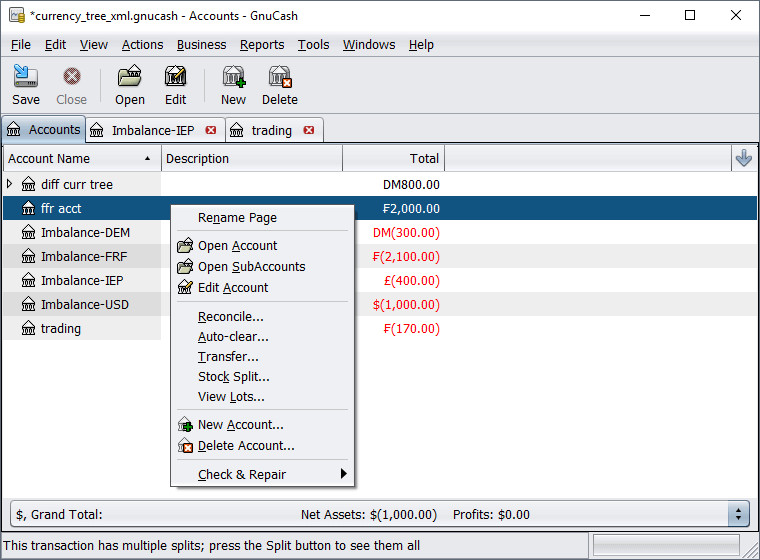
GnuCash is a personal and small business finance application, freely licensed under the GNU GPL and available for GNU/Linux, BSD, Solaris, Mac OS X and Microsoft Windows. It’s designed to be easy to use, yet powerful and flexible. GnuCash allows you to track your income and expenses, reconcile bank accounts, monitor stock portfolios and manage your small business finances. It is based on professional accounting principles to ensure balanced books and accurate reports.
GnuCash can keep track of your personal finances in as much detail as you prefer. If you are just starting out, use GnuCash to keep track of your checkbook. You may then decide to track cash as well as credit card purchases to better determine where your money is being spent. When you start investing, you can use GnuCash to help monitor your portfolio. Buying a vehicle or a home? GnuCash will help you plan the investment and track loan payments. If your financial records span the globe, GnuCash provides all the multiple-currency support you need.
Major highlights in GnuCash 4.0:
- A new Transaction Association dialog, available from the Update Association for Transaction menu item that has replaced the two association items in 3.x, allows setting, changing, and deleting associations.
- A symbol (paperclip for files, chain links for URLS) is now displayed in the Associations column (visible in double-line mode) in the register in place of the letters when a transaction has an association. This doesn't work on MacOS.
- Associations may now be added to bills, credit notes, invoices, and vouchers. The actual association when present is added as a link button which is shown below the notes.
- New type-ahead search is added to sequential search when selecting an account or an Action in the register: Instead of typing the first few characters of a top level account, the separator, the first few characters of the next level account and so on you may instead type a few characters of any part of a full account name and the drop-list will be filtered to contain only matching accounts. Once you have a small enough list you can use the arrow keys to select the account that you want.
- A new separate executable, gnucash-cli (gnucash-cli.exe on Microsoft Windows) for doing command-line things like updating the prices in your book. gnucash-cli gains the ability to run reports from the command line. Specify reports to run by name or guid. It also provides an export format and an output file name without which it will output the report to stdout.
- gnucash-cli --report run --name=[reportname/guid] datafile.gnucash
- gnucash-cli --report run --name=[reportname/guid] --output-file=x.html datafile.gnucash
- gnucash-cli --report run --name=[reportname/guid] --output-file=x.html --export-type=TYPE datafile.gnucash
- gnucash-cli --help will display a screen listing all of the available commands and their options.
- The GUI program, gnucash, still responds to the options it always has, though --get-price-quotes is deprecated in favor of gnucash-cli --quotes get.
Graphic User Interface
- When creating a new account hierarchy it's now possible to load account templates from locales other than the one set for the user interface.
- On the Choose Accounts to Create page there are two drop-downs above the Account Types selector, one for language and one for country, the choices in the latter depending on the former. The default is the current locale but they may be used to select account templates from any locale.
- When deleting accounts the destination accounts of moved splits will be checked to ensure that they have the same commodity as the source account. If they don't you'll get a warning and the opportunity to pick another account or to carry on regardless.
- Reversing transactions will now pop a dialog box to request a posting date.
Business Functions
- Business Document Column Widths
- Entry column widths in Invoices, Bills, and Employee Vouchers may now be saved as defaults for each type of document.
- Two menu items are added to the View menu when a Bill, Invoice, or Voucher tab has focus:
- Use as Default Layout for Vendor Documents
- Reset Default Layout for Vendor Documents
- Vendor Documents is for Bills and is replaced by Customer or Employee Documents for Invoices or Vouchers respectively.
- The first saves the current document's column widths and makes them the default for all documents in the same type. The second menu item removes the customization and documents of that type will therafter use the computed default widths.
Importing Transactions
- Support for AQBanking Version 6. This is required to support new FinTS protocols for the European Payment Services Directive (PSD2).
- The Import Map Editor (Tools>Edit Import Maps) will scan for Bayesian associations with non-existent accounts and display a dialog offering to remove any that are found. It also adds a button at the bottom of the Import Map Editor to delete them if one chooses not to use the dialog.
- The OFX file importer can now import more than one file at a time.
- OFX imports having balance information will now offer to immediately reconcile, passing the balance information in the file to the reconcile info.
- The import transaction matcher window column headings are changed from R to C and from U+R to U+C, reflecting that the matcher marks transactions cleared but doesn't reconcile them.
- Account matcher will decline to match accounts with a different commodity from the imported split if the import information includes the commodity.
- Ellipsize the Description and Memo fields in the account matcher.
Reports
- A new report menu supbmenu Multicolumn contains the old custom-multicolumn report and a new Dashboard report containing Account reports for expenses and income, an income-expense chart, and an account summary.
- Support for UK VAT and Australian GST have been added to the Income-GST report. The report's options are changed from source accounts to source sales and purchase accounts to permit proper reporting of capital purchases. N.B. This is incompatible with previous versions of the report and will require regenerating saved configurations.
Budgets
- Optionally include the account code option in budget view.
- Enable adding notes to budgets.
- Account codes may now optionally be displayed in the Budget Tree View..
Compatibility
- GnuCash 4.x will not migrate old gconf settings from GnuCash 2.4.x.
Customization and Scripting
- The GnuCash widget hierarchy for CSS has been revised to be more consistent with Gtk practice. You may need to spend some time with the GtkInspector to get your custom CSS back the way you like it.
- Python bindings are now localized and their strings available for translation.
For a complete list of new features and API changes see the Release Notes
Download: GnuCash 4.0 | 142.0 MB (Open Source)
Links: GnuCash Home page | Other Operating Systems
![]() Get alerted to all of our Software updates on Twitter at @NeowinSoftware
Get alerted to all of our Software updates on Twitter at @NeowinSoftware



















0 Comments - Add comment